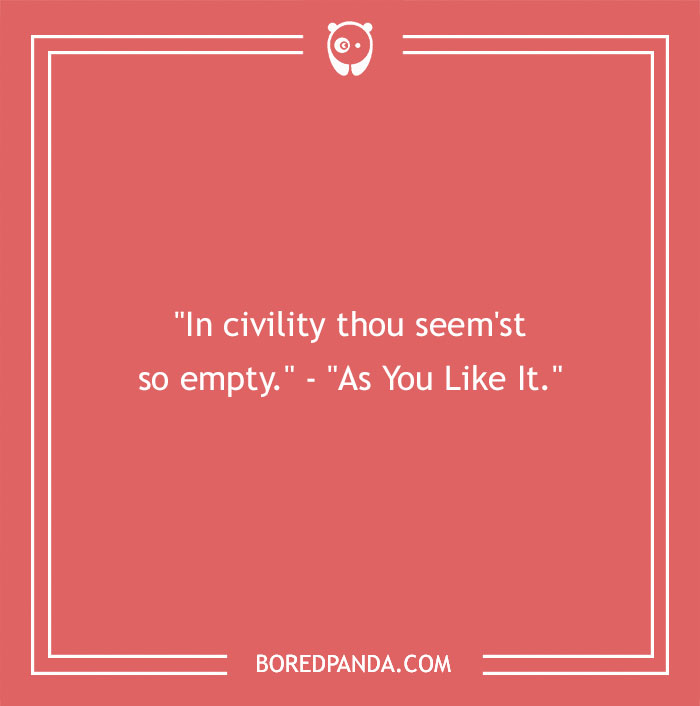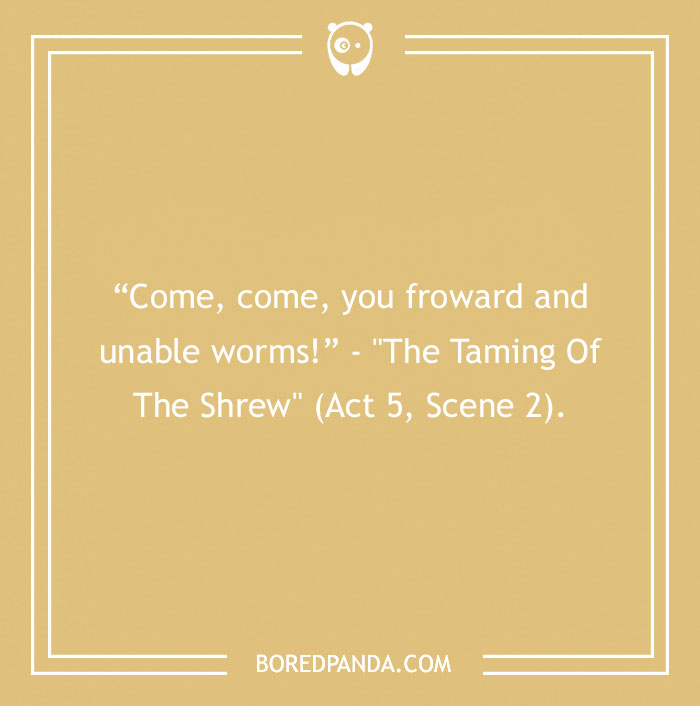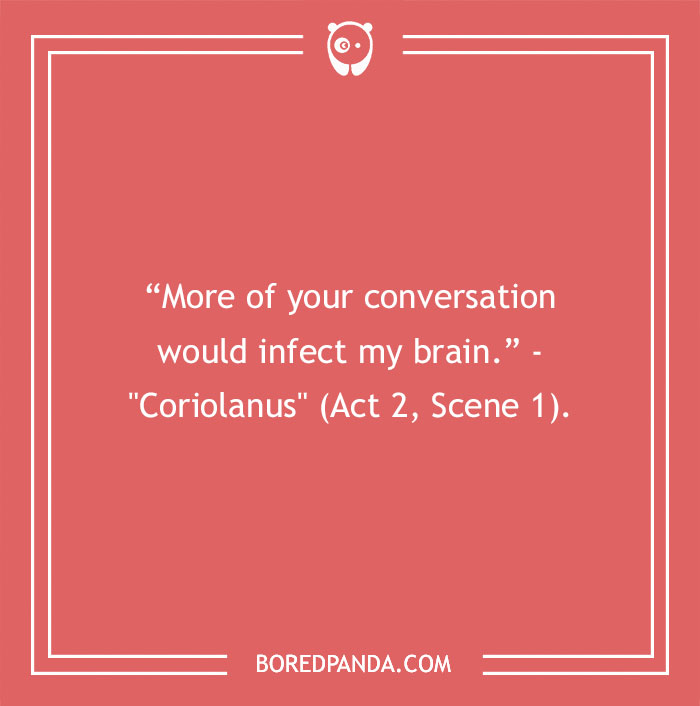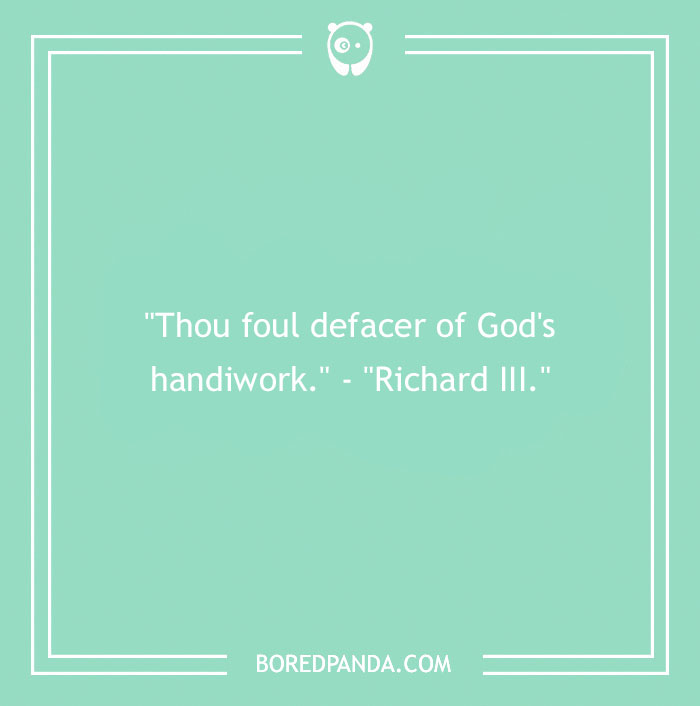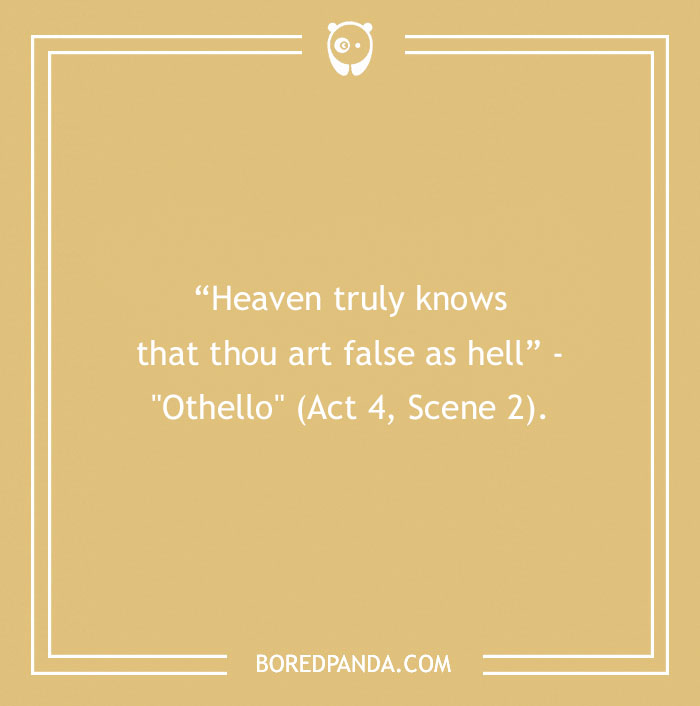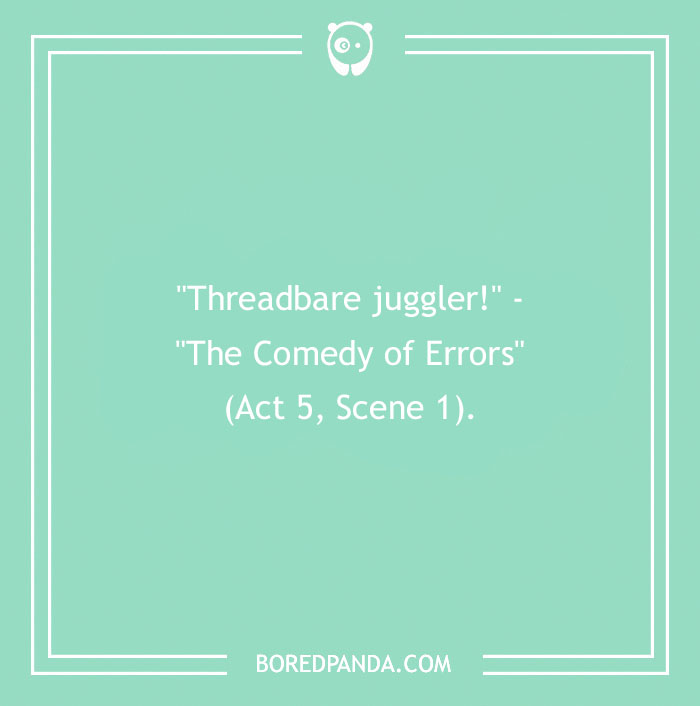Fie! Cometh h're and englut mine own coxcomb, thee distemperate daw! And plenty more of that, but in human language, is sure to come if you keep on reading (or just scrolling) our list of Shakespearean insults. Is there any better way to insult someone if not using the words by the one and only, the OG pun master, Willy S.? Not in our book, nuh-uh.
So, anyway, you might’ve heard of Shakespeare and his absolutely time-defying specimens of writing like Romeo and Juliet, Othello, or Hamlet. But have you ever stopped to think that William, besides being a legit word ninja, was also the person to come up with stuff like puns, yo mama jokes (yeah, really!), and unique insults that are so original and sophisticated that by using them, you’ll not only say your piece, but truly leave your opponent dumbfounded and feeling like a measly earthworm compared to the piece that just came out of your mouth? And if the last sentence already seemed like a mouthful due to missing dots and semicolons to break up the thoughts, then just hang on for a minute until you actually start reading these insults by Shakespeare.
Now, grab a quill and a piece of parchment because you’ll definitely want to write some of these awesome Shakespearean insults down, if not memorize them by heart. Although all of these swear words and sayings are a blast to read, some of them might just reverberate your heartstrings more; in that case, give them your vote! And lastly, share the absolute best insults by Shakespeare with anyone who’s into cursing like a real snob.
This post may include affiliate links.
 "He has not so much brain as ear-wax." - "Troilus and Cressida" (Act 5, Scene 1).
"He has not so much brain as ear-wax." - "Troilus and Cressida" (Act 5, Scene 1).
The Beshrewing of Tom o' Bedlam by Stewart Stafford Fie and a plague on thee! Nay, a pox! May legions of hellions float through thee, And may thou fall in the dung of an ox. May the thing below thine eyes, Take on the appearance of a sprout, And may the things above thy chin, Resemble a harlot's spout. May Heaven strike thee dumb, Aye, dumber than thou art now, May thy words become those of a lunatic, And thy breathing the grunting of a sow. Verily, I do not wish thee misfortune, Lest it rebounds back upon me, But, as long as it befalls thee first, I may live quite merrily. © Stewart Stafford, 2021. All rights reserved.
"I do desire that we may be better strangers." - "As You Like It" (Act 3, Scene 2).
“Thou damned and luxurious mountain goat.” - "Henry V" (Act 4, Scene 4).
“You have such a February face, So full of frost, of storm, and cloudiness.” - "Much Ado About Nothing" (Act 5, Scene 4).
 "They have a plentiful lack of wit." - "Hamlet" (Act 2, Scene 2).
"They have a plentiful lack of wit." - "Hamlet" (Act 2, Scene 2).
“What, you egg?” - "Macbeth" (Act 4, Scene 2).
“Away, you three-inch fool! “ - "The Taming of the Shrew" (Act 4, Scene 1).
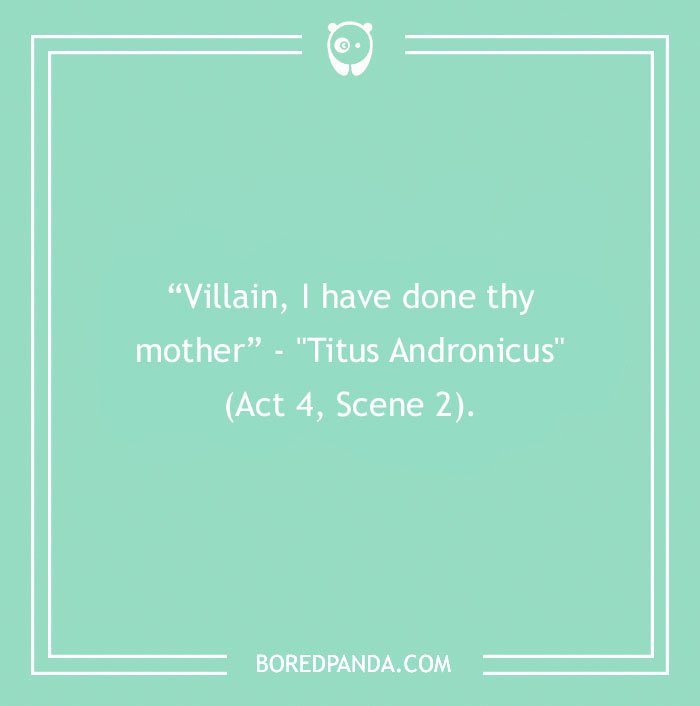 “Villain, I have done thy mother” - "Titus Andronicus" (Act 4, Scene 2).
“Villain, I have done thy mother” - "Titus Andronicus" (Act 4, Scene 2).
“I’d beat thee, but I should infect my hands.” - "Timon of Athens."
“Your brain is as dry as the remainder biscuit after voyage.” - "As You Like It" (Act 2, Scene 7).
“No longer from head to foot than from hip to hip, she is spherical, like a globe; I could find countries in her.” - "The Comedy of Errors" (Act 3, Scene 2).
If this was written today, The Bard would be blocked for body shaming !
"I do wish thou were a dog, that I might love thee something." - "Timon of Athens" (Act 4, Scene 4).
“Men from children nothing differ.” - "Much Ado About Nothing."
“You starvelling, you eel-skin, you dried neat’s-tongue, you bull’s-pizzle, you stock-fish–O for breath to utter what is like thee!-you tailor’s-yard, you sheath, you bow-case, you vile standing tuck!” - "Henry IV Part 1" (Act 2, Scene 4).
"That kiss is as comfortless as frozen water to a starved snake." - "Titus Andronicus."
“Out of my sight! Thou dost infect mine eyes.” - "Richard III" (Act 1, Scene 2).
Oh alright, I won't forget to put makeup on before breakfast again. Geez.
“You are as a candle, the better burnt out.” - "Henry IV Part 2" (Act 1, Scene 2).
hey man, don't knock candles- how else are we supposed to have our romantic evenings?
"If you spend word for word with me, I shall make your wit bankrupt." - "Two Gentlemen of Verona" (Act 2, Scene 4).
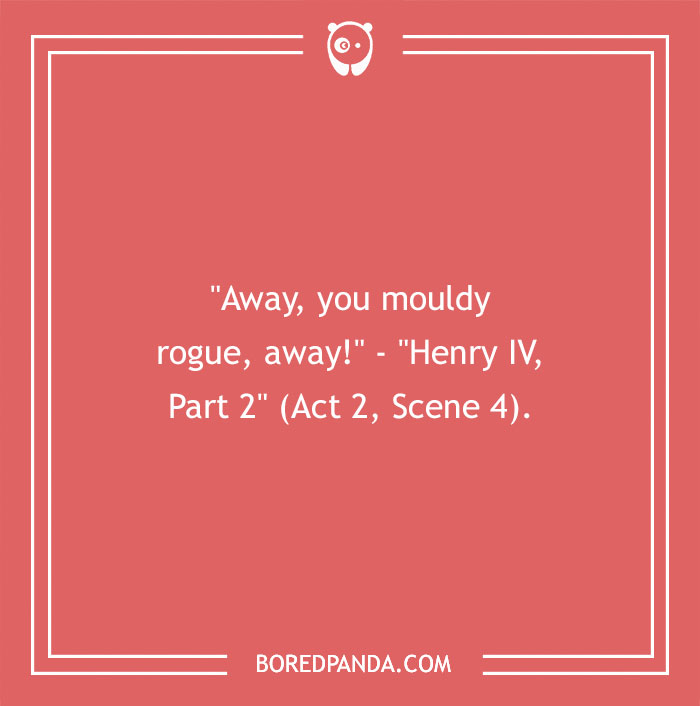 "Away, you mouldy rogue, away!" - "Henry IV, Part 2" (Act 2, Scene 4).
"Away, you mouldy rogue, away!" - "Henry IV, Part 2" (Act 2, Scene 4).
“There’s no more faith in thee than in a stewed prune.” - "Henry IV Part 1" (Act 3, Scene 3).
“Thou lump of foul deformity.” - "Richard III" (Act 1, Scene 2).
"She hath more hair than wit, and more faults than hairs, and more wealth than faults." - "Two Gentlemen of Verona" (Act 3, Scene 1).
“I am sick when I do look on thee.” - "A Midsummer Night’s Dream" (Act 2, Scene 1).
My sentiment to everyone posting the title of a post as their remark, Remarkable, you c**t.
 "You, minion, are too saucy." - "The Two Gentlemen of Verona" (Act 1, Scene 2).
"You, minion, are too saucy." - "The Two Gentlemen of Verona" (Act 1, Scene 2).
"You do unbend your noble strength, to think so brainsickly of things." - "Macbeth."
I see there are fewer morons here than usual. A buffet of splendours then.
“The rankest compound of villainous smell that ever offended nostril.” - "The Merry Wives of Windsor" (Act 3, Scene 5).
“Thou art a boil, a plague sore.” - "King Lear" (Act 2, Scene 2).
Thou art a combination of monkey and pig, you abomination born of a whore! This is so much fun! I have GOT to steal some of these burns🔥
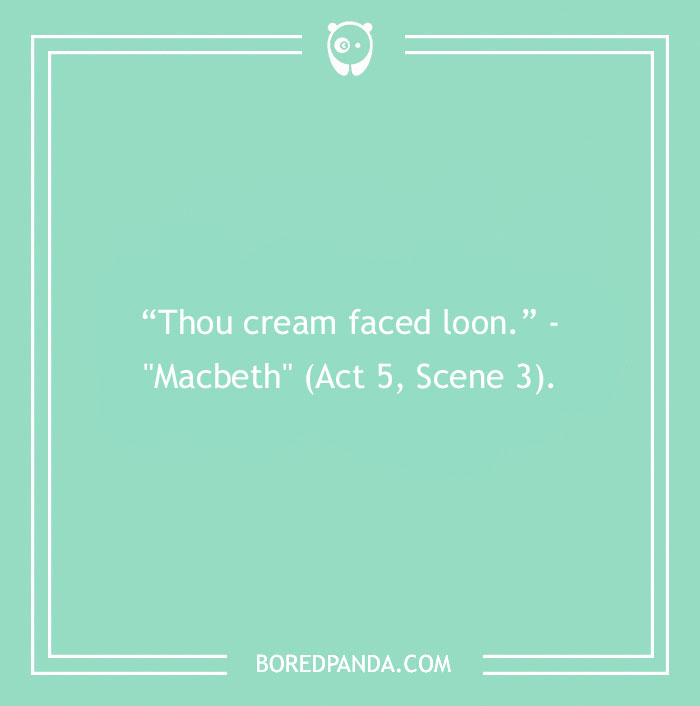 “Thou cream faced loon.” - "Macbeth" (Act 5, Scene 3).
“Thou cream faced loon.” - "Macbeth" (Act 5, Scene 3).
"Your abilities are too infant-like for doing much alone." - "Coriolanus" (Act 2, Scene 1).
“Thou art a very ragged wart.” - "Henry IV" (Act 3, Scene 2).
“His wit’s as thick as a Tewkesbury mustard.” - "Henry IV Part 2" (Act 2, Scene 4).
I have more wit then thine own tongue could mutter, thy bulbous brained lead licker!
“Thou sodden-witted lord! Thou hast no more brain than I have in mine elbows.” - "Troilus and Cressida" (Act 2, Scene 1).
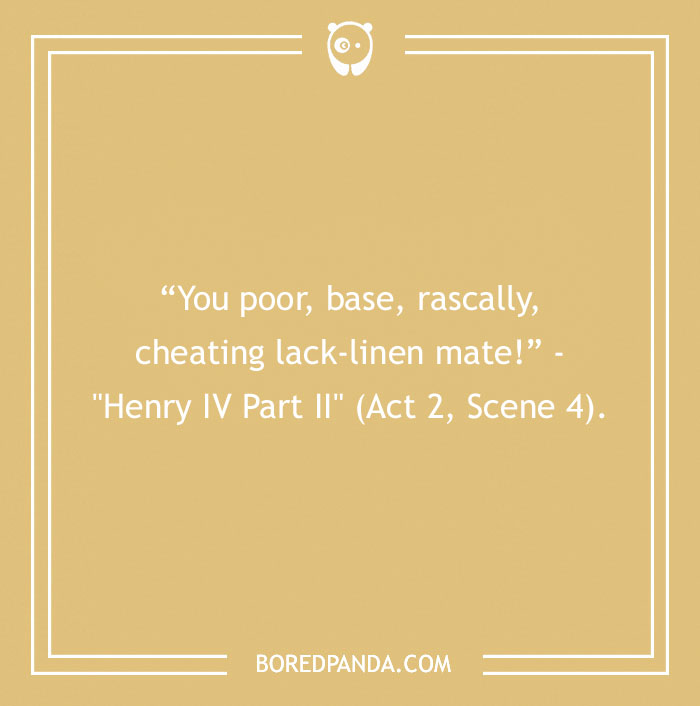 “You poor, base, rascally, cheating lack-linen mate!” - "Henry IV Part II" (Act 2, Scene 4).
“You poor, base, rascally, cheating lack-linen mate!” - "Henry IV Part II" (Act 2, Scene 4).
"You are not worth another word, else I’d call you knave." - "All’s Well That Ends Well" (Act 2, Scene 3).
"Drunkenness is his best virtue, for he will be swine drunk, and in his sleep he does little harm, save to his bedclothes about him." - "All’s Well That Ends Well" (Act 4, Scene 3).
"Thou flea, thou nit, thou winter-cricket thou!" - "The Taming of the Shrew" (Act 3, Scene 3).
"Thou art a base, proud, shallow, beggarly, three-suited, hundred-pound, filthy worsted-stocking knave; a lily-liver’d, action-taking, whoreson, glass-gazing, superserviceable, finical rogue; one-trunk-inheriting slave; one that wouldst be a bawd in way of good service, and art nothing but the composition of a knave, beggar, coward, pandar, and the son and heir of a mongrel b***h." - "King Lear" (Act 2, Scene 2).
The Bard's word is spelt B. I. T. C. H. thou presumptuous knave, to whom English is but passing familiar and censure the more valued product of thy rectal rectitude.
“A most notable coward, an infinite and endless liar, an hourly promise breaker, the owner of no one good quality.” - "All’s Well That Ends Well" (Act 3, Scene 6).
Shakespeare met Santos? I'm surprised he didn't put that in his resume.
“If thou wilt needs marry, marry a fool; for wise men know well enough what monsters you make of them.” - "Hamlet" (Act 3, Scene 1).
“Methink’st thou art a general offence and every man should beat thee.” - "All’s Well That Ends Well" (Act 2, Scene 3).
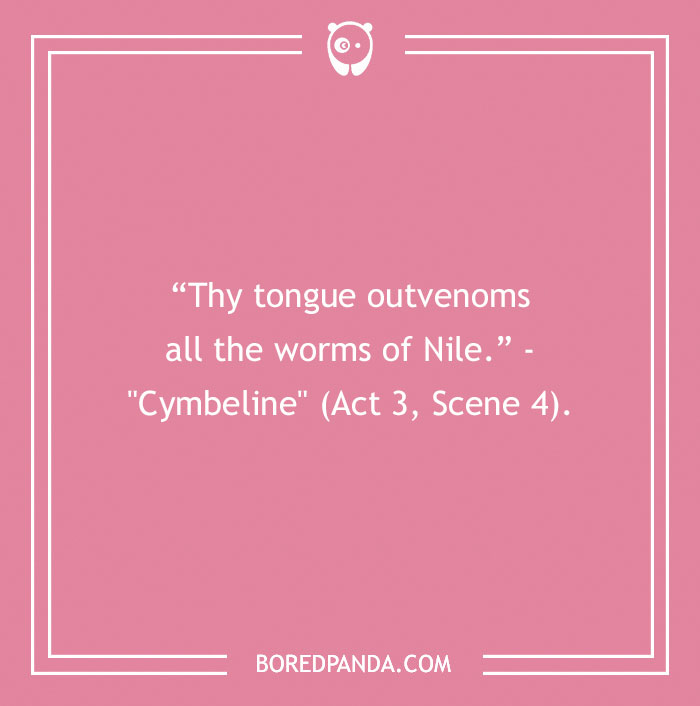 “Thy tongue outvenoms all the worms of Nile.” - "Cymbeline" (Act 3, Scene 4).
“Thy tongue outvenoms all the worms of Nile.” - "Cymbeline" (Act 3, Scene 4).
“Thou art as fat as butter.” - "Henry IV Part 1" (Act 2, Scene 4).
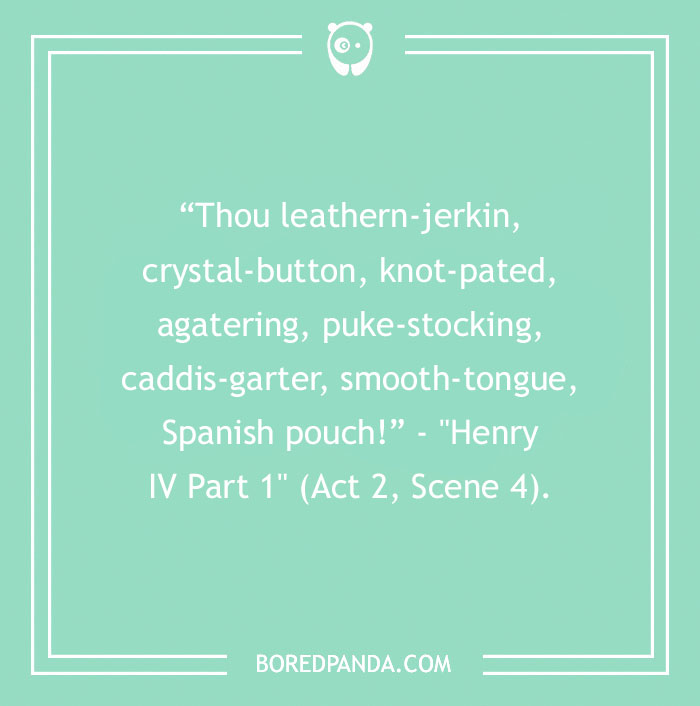 “Thou leathern-jerkin, crystal-button, knot-pated, agatering, puke-stocking, caddis-garter, smooth-tongue, Spanish pouch!” - "Henry IV Part 1" (Act 2, Scene 4).
“Thou leathern-jerkin, crystal-button, knot-pated, agatering, puke-stocking, caddis-garter, smooth-tongue, Spanish pouch!” - "Henry IV Part 1" (Act 2, Scene 4).
“Thy sin’s not accidental, but a trade.” - "Measure For Measure" (Act 3, Scene 1).
"You are now sailed into the north of my lady’s opinion, where you will hang like an icicle on a Dutchman’s beard." - "Twelfth Night" (Act 3, Scene 2).
"Thou hateful wither’d hag!" - "Richard III" (Act I, Scene 3).
“Thou subtle, perjur’d, false, disloyal man!” - "The Two Gentlemen of Verona" (Act 4, Scene 2).
"You should be women, and yet your beards forbid me to interpret that you are so." - "Macbeth" (Act 1, Scene 3).
"Thou art the cap of all the fools." - "Timon of Athens" (Act 4, Scene 3).
“My wife’s a hobby horse!” - "The Winter’s Tale" (Act 2, Scene 1).
“That trunk of humours, that bolting-hutch of beastliness, that swollen parcel of dropsies, that huge bombard of sack, that stuffed cloak-bag of guts, that roasted Manningtree ox with pudding in his belly, that reverend vice, that grey Iniquity, that father ruffian, that vanity in years?” - "Henry IV Part 1" (Act 2, Scene 4).
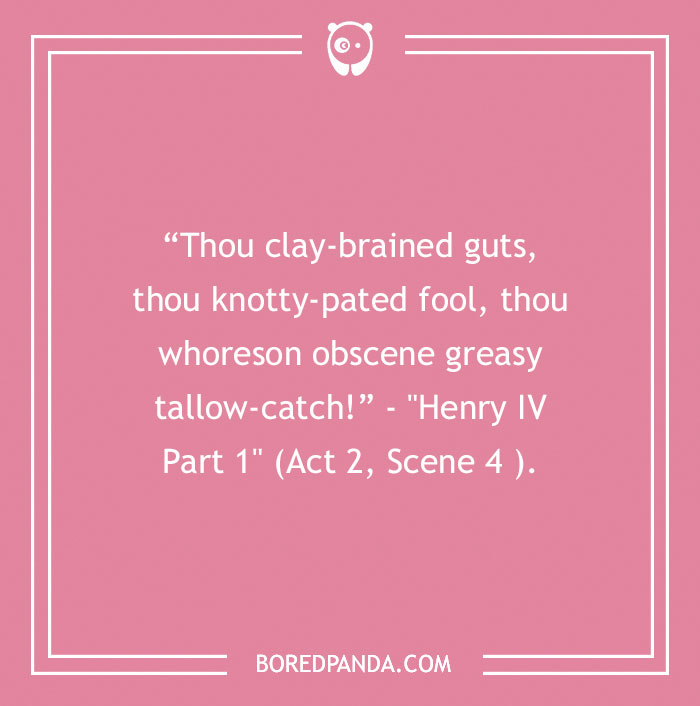 “Thou clay-brained guts, thou knotty-pated fool, thou whoreson obscene greasy tallow-catch!” - "Henry IV Part 1" (Act 2, Scene 4 ).
“Thou clay-brained guts, thou knotty-pated fool, thou whoreson obscene greasy tallow-catch!” - "Henry IV Part 1" (Act 2, Scene 4 ).
"O you beast! I’ll so maul you and your toasting-iron, That you shall think the devil is come from hell." - "King John" (Act 4, Scene 3).
“Thine forward voice, now, is to speak well of thine friend; thine backward voice is to utter foul speeches and to detract.” - "The Tempest" (Act 2, Scene 2).
“Thou whoreson zed, thou unnecessary letter!” - "King Lear" (Act 2, Scene 2 ).
I would be interested in which is the least-used letter, but I wouldn't be interested in doing the tallying up.
“You scullion! You rampallian! You fustilarian! I’ll tickle your catastrophe!” - "Henry IV Part 2" (Act 2, Scene 1).
“You starveling, you eel-skin, you dried neat’s tongue, you bull’s pizzle, you stock-fish!” - "Henry IV Part 1."
“Away, you starvelling, you elf-skin, you dried neat’s-tongue, bull’s-pizzle, you stock-fish!” - "Henry IV Part 1" (Act 2, Scene 4).
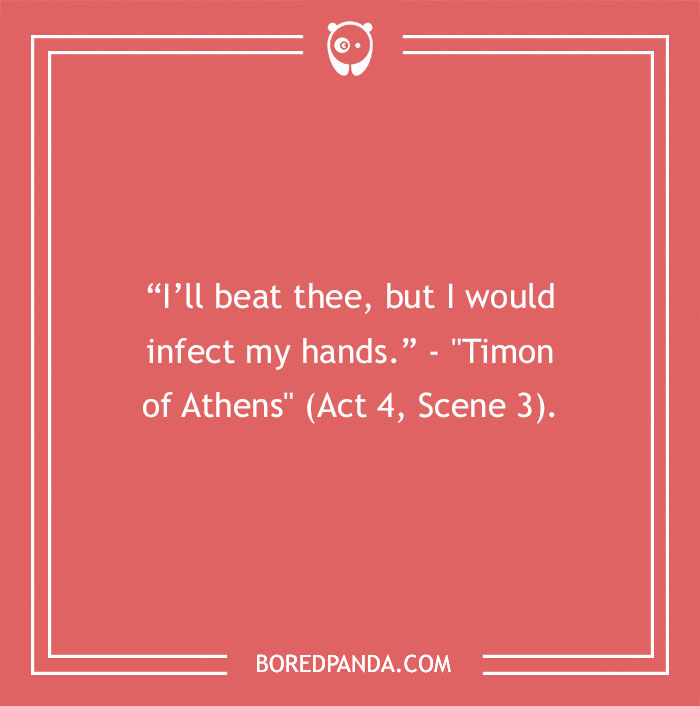 “I’ll beat thee, but I would infect my hands.” - "Timon of Athens" (Act 4, Scene 3).
“I’ll beat thee, but I would infect my hands.” - "Timon of Athens" (Act 4, Scene 3).
“Was the Duke a flesh-monger, a fool and a coward?” - "Measure For Measure" (Act 5, Scene 1).
“Here is the babe, as loathsome as a toad.” - "Titus Andronicus" (Act 4, Scene 3).
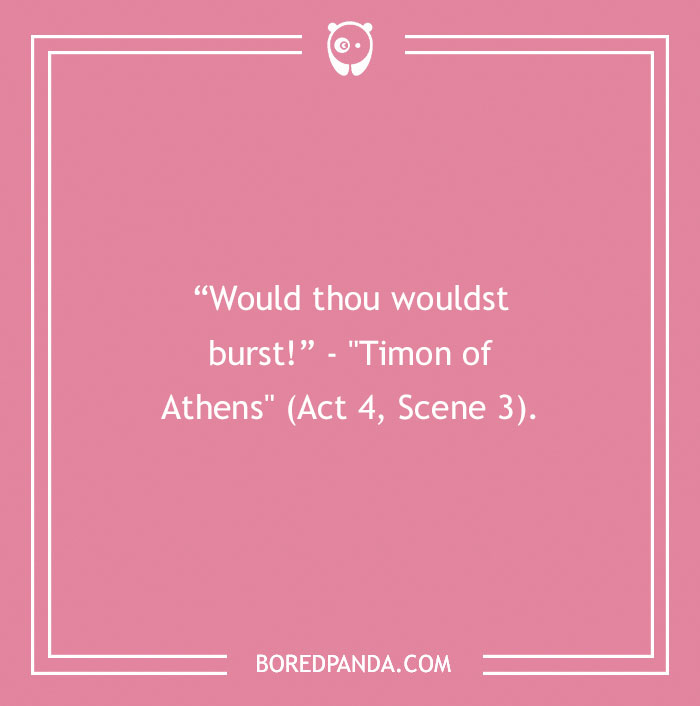 “Would thou wouldst burst!” - "Timon of Athens" (Act 4, Scene 3).
“Would thou wouldst burst!” - "Timon of Athens" (Act 4, Scene 3).
"Four of his five wits went halting off, and now is the whole man governed with one: so that if he have wit enough to keep himself warm, let him bear it for a difference between himself and his horse; for it is all the wealth that he hath left, to be known a reasonable creature." - "Much Ado About Nothing" (Act 1, Scene 1).
"It is a tale told by an idiot, full of sound and fury, signifying nothing." - "Macbeth" (Act 5, Scene 5).
"Away thou rag, thou quantity, thou remnant." - "The Taming of the Shrew" (Act 4, Scene 3).
"Foul spoken coward, that thund’rest with thy tongue, and with thy weapon nothing dares perform." - "Titus Andronicus" (Act 2, Scene 1).
"Saucy lackey!" - "As You Like It" (Act 3, Scene 2).
"A weasel hath not such a deal of spleen as you are toss’d with." - "Henry IV, Part 1" (Act 2, Scene 3).
 "By mine honour, if I were but two hours younger, I’d beat thee." - "All’s Well That Ends Well" (Act 2, Scene 3).
"By mine honour, if I were but two hours younger, I’d beat thee." - "All’s Well That Ends Well" (Act 2, Scene 3).
"Bloody, bawdy villain! Remorseless, treacherous, lecherous, kindless villain!" - "Hamlet" (Act 2, Scene 2).
"Come, come, you froward and unable worms!" - "The Taming Of The Shrew" (Act 5, Scene 2).
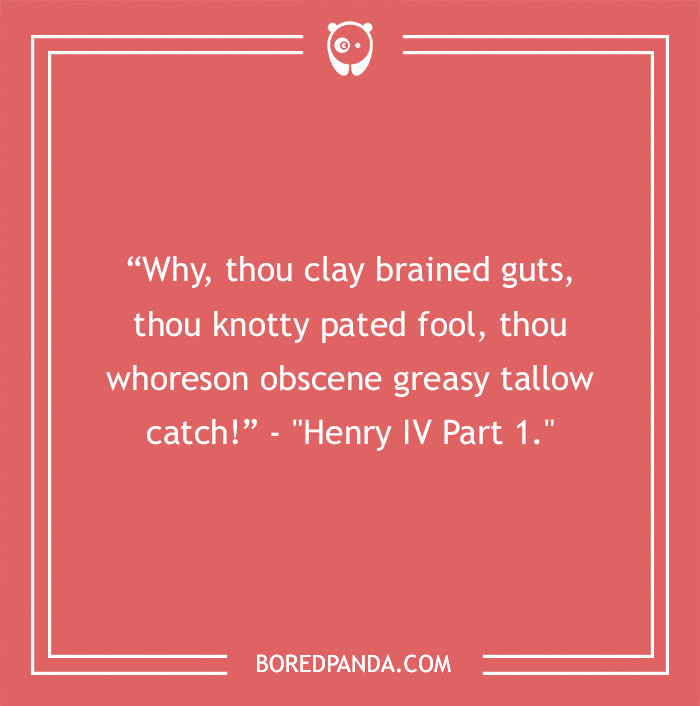 “Why, thou clay brained guts, thou knotty pated fool, thou whoreson obscene greasy tallow catch!” - "Henry IV Part 1."
“Why, thou clay brained guts, thou knotty pated fool, thou whoreson obscene greasy tallow catch!” - "Henry IV Part 1."

 Dark Mode
Dark Mode 

 No fees, cancel anytime
No fees, cancel anytime 









